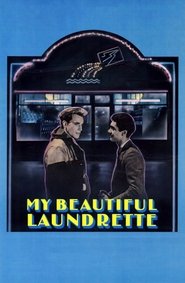Omar and Johnny also tenderly fuck on occasion, which Frears and Kureishi treat with a casualness that remains revelatory. My Beautiful Laundrette isn’t a gay “issues” film, and it isn’t intended as a soapbox lecture about British nationalism either. It isn’t even a simple condemnation of Thatcherism. The film is about all of these things and none of these things simultaneously, and that’s what makes your head spin: the realization that the filmmakers intend to treat you like an adult who understands that absolutism, of even an idealistic bent, is the indulgence of a fool. […] This [film shows the] capitalist trap in microcosm: to feel inferior and over-compensatory regardless of one’s lot in life, even if said lot involves a spot that’s unambiguously at the top of the pecking order. These taboo subjects are subsumed into the texture of the narrative with a sense of tossed-off, “shit happens” bonhomie.
— Chuck Bowen (Slant)
The film’s larger concern is the struggle of Asian immigrants […] to maintain their ethnic identities while assimilating into a society that offers material rewards for those prepared to abandon their traditions. […] Channel 4’s public-service remit enabled commissioning editor David Rose’s Film on Four wing to act as a studio for small British films about unprivileged or marginalized people […]. This countered the panaceas of “heritage” costume and British Empire dramas, redolent of conservatism’s xenophobia and investment in the class system, which [director] Frears has often criticized, describing it to me once as “the rattling of teacups.” […] The fact that Omar and Johnny’s sexual relationship is not a source of social conflict, unlike that of Nasser and Rachel, is significant. It’s a masterful stroke of gay-straight taboo reversal that proposes that behavior conventional society has historically vilified may be the most likely to promote harmony. […] Frears’s masterstroke was to deploy throughout a mise-en-scène that brings to the film a level of revelatory metacinematic self-consciousness. The key to this is the laundrette’s “Powders” neon sign, which makes its exterior resemble that of a small cinema. The interior is deep, as are those of many repertory theaters, and a “widescreen” window separates the washing, drying, and folding area (the space where the “action” takes place) from the back office (a darkened space from which the action can be viewed).
— Graham Fuller (Criterion)
When Channel 4 approached [screenwriter Hanif Kureishi], his first instinct was to write a sprawling multigenerational family epic that did for Pakistanis in Britain what The Godfather had done for Italians in America. [Still,] both films are about immigrants fighting to be accepted in their new homeland; when one of the characters says “I believe in England,” there is an unmistakable echo of the opening line from The Godfather.
— Sarfraz Manzoor (Criterion)
My Beautiful Laundrette was originally made for UK television’s Channel 4. That network, made possible by the deregulation of the Margaret Thatcher era, ironically ended up giving voice to those hardest hit by Thatcher’s economic policies.
— By Kim Hendrickson (Criterion)
One of those movies that validates your life experience and worldview at a point when it needs validating, making you feel as if you are not just seeing but being seen as you watch it. Seen now, without that brave-new-world charge, the sex scenes seem a little stagey and the chemistry between Omar and Johnny feels lame—especially in the final scene where the two splash water on each other’s bare chests, as self-conscious as bad actors in a porno. […] The music is annoyingly insistent too, and the costumes a little too on-the-nose […], and sometimes Frears and cinematographer Oliver Stapleton try too hard to wring meaning out of the visuals, like when they line up Johnny and Omar on either side of a window so one boy’s face merges with the other’s reflection. [And, finally,] Rita Wolf invests the underwritten role of his daughter with a kind of ferocious frustration.
— Elise Nakhnikian (Slant)

